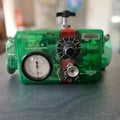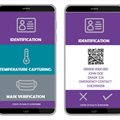
Subscribe & Follow
Jobs
- Lecturer – School of Commerce (Economics) Pretoria
- Lecturer – School of Education (History & Geography) Pretoria
- Lecturer: Management Studies-Supply Chain (Part-Time) Port Elizabeth
- Senior Producing Lecturer Johannesburg
- Contract School-Based Teaching Practice Assessor - National National
- Interior Design Lecturer Potchefstroom
- Lecturer - Commerce (Finance & Accounting related modules) Pretoria
- Debtors Clerk Pretoria
- Lecturer - School of Law (Permanent) Pretoria
- Lecturer: Afrikaans Language (School of Education) Durban
NWU's partner consortium launches ventilator design competition for students
This is why a new competition by the Mahlale Innovation Consortium (MIC), of which the North-West University (NWU) is part, seeks to find alternative means for emergency ventilations. The quest is especially for equipment that can be used in states of emergency for the decentralised treatment of non-intensive care Covid-19 patients to reduce hospitalisation.
The MIC has launched a competition that gives students an opportunity to design ventilator solutions and related services and business ideas that can make significant contributions to the fight against the pandemic. The aim is to flatten the curve of health-related pandemics such as Covid-19.
Competition elevates students’ innovations
“The challenge enables participants to gain real industry experience, practical employability skills and enhanced business and people skills, all within a set time frame. The best ideas seem impossible at first, but in this new age they could change the world,” says one of the competition judges, Prof. Leenta Grobler, vice-chair of the project team and spokesperson for the competition. Prof. Grobler is the acting director for business development and stakeholder engagement at the NWU’s Faculty of Engineering.
“The competition will encourage the new generation to rethink a positive future and to make more ventilators. Of course, being able to picture a future like this is not the same thing as knowing what to do to make it a reality, but by entering the competition we will help them to put their ideas into practice.”
Registered South African students and learners can enter their creative and innovative ideas, concepts and self-improvised solutions in three categories.
The first category is an open category for any service or product that they have implemented to flatten the curve during Covid-19. The second is an innovation category for any new business idea, invention or innovation that can be used to combat Covid-19 or other health-related threats in the future and the third category is an engineering category for any improvements, innovations or concepts that will reduce the shortage of ventilators in South Africa.
Entries are now open and can be submitted until 8am on Monday, 14 June. After this, the top nine entries will be selected. The virtual prize-giving, during which cash prizes will be awarded, will take place on 30 June.
For more information on the competition or to enter, visit the MIC website at: http://mahlaleinnovationconsortium.co.za/
More about the MIC
The MIC is an alliance of five higher-education institutions ― the NWU, the Central University of Technology Free State, Tshwane University of Technology, University of Johannesburg and the Vaal University of Technology – in response to a request from the Manufacturing, Engineering and Related Services SETA (merSETA).
MIC promotes the local manufacturing of ventilators to contribute to the South African government’s National Ventilator Project.
NWU engineers take up the challenge
As part of the consortium, the NWU is making significant contributions with a specific focus on digital health devices and remote monitoring.
“When newspapers all over the world flooded us with news of a critical ventilator shortage, merSETA reached out to academic institutions to address this shortage, but also to use this as an opportunity to address the skills gap in the medical device sector in South Africa,” says Prof. Grobler.
She says that as the NWU engineers spent time with healthcare workers in the local communities, they realised that there was another crisis behind the ventilator crisis.
“The biggest constraint was not the ventilators, but rather the number of trained intensive care unit (ICU) staff members who were able to monitor the ventilators. They have critical skills that cannot be transferred in a short period of time, making them the most critical resource to protect and empower.”
Prof. Grobler says the NWU’s contribution to the Virovent Skills Challenge is a universal, non-invasive remote condition-monitoring system. It is a low-cost, high-impact digital system that enables remote patient care and support for ventilated patients both in hospitals and at home.
She says this comprises an online data-capturing device between the ventilator and the patient and a web-based remote monitoring dashboard that – in addition to detailed patient-specific information – also performs a digital solution to reduce the sensory overload of ICU staff.
“In doing so, our patented solution enables better outcomes for all: fewer nurses will be able to safely monitor larger numbers of patients, while we will also protect this critical resource – our ICU staff – during future pandemics.”
- North-West University at the forefront of agricultural innovation09 Dec 15:56
- SADiLaR launches higher education support programme to advance multilingualism in SA’s universities03 Dec 15:37
- isiNdebele transitions to Wikipedia’s main platform, expanding visibility for official SA languages03 Dec 15:35
- Prof Raymond Parsons to be awarded an honorary doctorate by the NWU28 Nov 13:46
- SADiLaR - Champion of SA languages’ digital future finds permanent home at NWU21 Nov 08:56

















